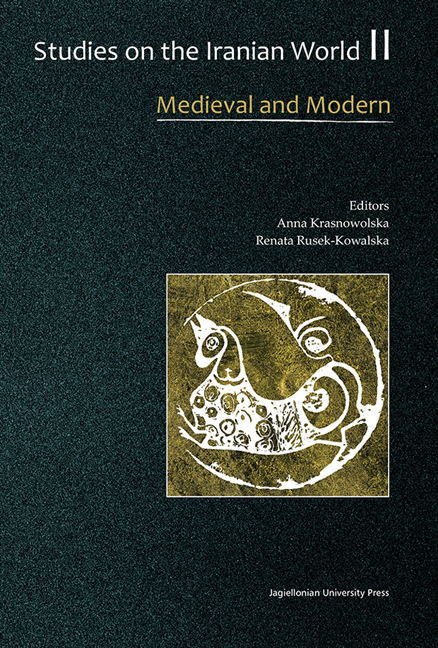Book contents
- Frontmatter
- Contents
- Foreword
- Linguistics
- Literature
- Religion
- History
- Arts
- Social and Cultural Studies
- Amulets and Medical Cures in the Yaghnob Valley: an Overview of Yaghnobi Traditional Medicine between Magic and Healing Folklore
- Persian Cookbooks, the ‘Myth’ of National Cuisine and the Process of Modernisation
- Modernity and Fertility Decline in Iran
- Medicine and Anthropology: the ‘Ambassador-Physician’ Jacob Eduard Polak (1818–1891) as a Mediator of Modernity in Iran
- Anatomy and Therapy of Eye-Diseases in Esmā῾īl Gorgānī Compared to Syriac Sources
- The Trans-Iranian Railway – History and Socio-Political Implications
- Traditional Diet and Allopathic Medicine in Diagnosis and Treatment in Iran
Persian Cookbooks, the ‘Myth’ of National Cuisine and the Process of Modernisation
from Social and Cultural Studies
Published online by Cambridge University Press: 12 January 2018
- Frontmatter
- Contents
- Foreword
- Linguistics
- Literature
- Religion
- History
- Arts
- Social and Cultural Studies
- Amulets and Medical Cures in the Yaghnob Valley: an Overview of Yaghnobi Traditional Medicine between Magic and Healing Folklore
- Persian Cookbooks, the ‘Myth’ of National Cuisine and the Process of Modernisation
- Modernity and Fertility Decline in Iran
- Medicine and Anthropology: the ‘Ambassador-Physician’ Jacob Eduard Polak (1818–1891) as a Mediator of Modernity in Iran
- Anatomy and Therapy of Eye-Diseases in Esmā῾īl Gorgānī Compared to Syriac Sources
- The Trans-Iranian Railway – History and Socio-Political Implications
- Traditional Diet and Allopathic Medicine in Diagnosis and Treatment in Iran
Summary
SUMMARY
There is hardly any doubt to be found that nutrition and culinary aspects play an essential role in debates referring to the process of modernization. In this paper, texts of three Persian cookbooks – one from Iran, one from Afghanistan and one from Tajikistan – will be presented as indicators and even as circumstantial proofs for different ways into modernity, in three different countries: Tabbâxi-ye Nejât, by Nejâto d-doule (Tehran, early 20th century), Tabx-e ta’âm barâ-ye maktab-e fonun-e harbiye, written by General as-Sayyid Mahmud Sâmi (Kabul 1337 h.), and Taomhoi tojikî, by S.A. Aminov (Stalinobod 1959).
This contribution is dedicated to the memory of the great master of Iranian Studies throughout the second half of the twentieth century until the year he passed away – the unforgettable professor Iraj Afshar, an incomparable scholar and also a precious personal friend of mine. The services he rendered to the expansion of knowledge concerning cultural affairs of his homeland, Iran, are countless, and his manifold contributions to the field of Iranian Studies as an international and world-wide discipline of learnedness cannot be overestimated.
Among many other themes, he deserves our thankful feelings with regard to his important stimulations for research concerning popular material and everyday's culture of Iran in past and present. It has been roughly more than thirty years ago when I got knowledge about his edition of two manuscripts containing texts of historical cookbooks in Persian language originating from the 16th century – one having been written by a cook who was employed at the court of Shāh Esmā‘īl I – the founder of the Safavid dynasty – and the other one also by a professional courtly cook who worked at the service of Shāh ‘Abbās I. Some years later – at the occasion of the 22nd ‘Deutscher Orientalistentag’ at the University of Tübingen (1983) – I had decided to present a paper on the genre of Persian cookbooks dealing with this kind of texts methodically treating them as sources of important relevance for what had not yet been generally called ‘cultural sciences’, at that time. Subsequently, I had made fascinating experiences in due course by continuously studying and analysing Persian cookbooks from the 16th until the 20th centuries: Jack Goody, Pierre Bourdieu, and Norbert Elias were some of the authors on whom I relied substantially in order to raise serious questions to ‘my’ texts.
- Type
- Chapter
- Information
- Studies on the Iranian WorldMedieval and Modern, pp. 305 - 318Publisher: Jagiellonian University PressPrint publication year: 2015



